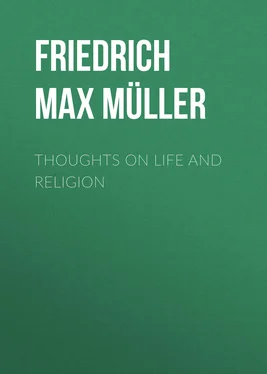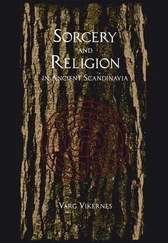Friedrich Max Müller - Thoughts on Life and Religion
Здесь есть возможность читать онлайн «Friedrich Max Müller - Thoughts on Life and Religion» — ознакомительный отрывок электронной книги совершенно бесплатно, а после прочтения отрывка купить полную версию. В некоторых случаях можно слушать аудио, скачать через торрент в формате fb2 и присутствует краткое содержание. Жанр: foreign_prose, foreign_religion, Философия, foreign_psychology, foreign_antique, на английском языке. Описание произведения, (предисловие) а так же отзывы посетителей доступны на портале библиотеки ЛибКат.
- Название:Thoughts on Life and Religion
- Автор:
- Жанр:
- Год:неизвестен
- ISBN:нет данных
- Рейтинг книги:3 / 5. Голосов: 1
-
Избранное:Добавить в избранное
- Отзывы:
-
Ваша оценка:
- 60
- 1
- 2
- 3
- 4
- 5
Thoughts on Life and Religion: краткое содержание, описание и аннотация
Предлагаем к чтению аннотацию, описание, краткое содержание или предисловие (зависит от того, что написал сам автор книги «Thoughts on Life and Religion»). Если вы не нашли необходимую информацию о книге — напишите в комментариях, мы постараемся отыскать её.
Thoughts on Life and Religion — читать онлайн ознакомительный отрывок
Ниже представлен текст книги, разбитый по страницам. Система сохранения места последней прочитанной страницы, позволяет с удобством читать онлайн бесплатно книгу «Thoughts on Life and Religion», без необходимости каждый раз заново искать на чём Вы остановились. Поставьте закладку, и сможете в любой момент перейти на страницу, на которой закончили чтение.
Интервал:
Закладка:
What is more natural in life than death? and having lived this long life, so full of light, having been led so kindly by a Fatherly hand through all storms and struggles, why should I be afraid when I have to make the last step?
Life.THE DEITY
We clearly see that the possibility of intercourse between man and God, and a revelation of God to man, depends chiefly or exclusively on the conception which man has previously formed of God and man. In all theological researches we must carefully bear in mind that the idea of God is our idea, which we have formed in part through tradition, and in part by our own thinking. God is and remains our God. We can have a knowledge of Him only through our inner consciousness, not through our senses.
Silesian Horseherd.Our duties toward God and man, our love for God and for man, are as nothing without the firm foundation which is formed only by our faith in God, as the Thinker and Ruler of the world, the Father of the Son, who was revealed through Him as the Father of all sons, of all men.
Silesian Horseherd.Though Christianity has given us a purer and truer idea of the Godhead, of the majesty of His power and the holiness of His will, there remains with many of us the conception of a merely objective Deity. God is still with many of us in the clouds, so far removed from the earth and so high above anything human, that in trying to realise fully the meaning of Christ's teaching we often shrink from approaching too near to the blinding effulgence of Jehovah. The idea that we should stand to Him in the relation of children to their father seems to some people almost irreverent, and the thought that God is near us everywhere, the belief that we are also His offspring, nay, that there has never been an absolute barrier between divinity and humanity, has often been branded as Pantheism. Yet Christianity would not be Christianity without this so-called Pantheism, and it is only some lingering belief in something like a Jove-like Deus Optimus Maximus that keeps the eyes of our mind fixed with awe on the God of Nature without, rather than on the much more awful God of the soul within.
Chips.The idea of God is the result of an unbroken historical evolution, call it a development, an unveiling, or a purification, but not of a sudden revelation.... What right have we to find fault with the manner in which the Divine revealed itself, first to the eyes, and then to the mind, of man? Is the revelation in nature really so contemptible a thing that we can afford to despise it, or at the utmost treat it as good enough for the heathen world? Our eyes must have grown very dim, our mind very dull, if we can no longer perceive how the heavens declare the glory of God.
Gifford Lectures, II.A belief in one Supreme God, even if at first it was only a henotheistic, and not yet a monotheistic belief, took possession of the leading spirits of the Jewish race at a very early time. All tradition assigns that belief in One God, the Most High, to Abraham. Abraham, though he did not deny the existence of the gods worshipped by the neighbouring tribes, yet looked upon them as different from, and as decidedly inferior to, his own God. His monotheism was, no doubt, narrow. His God was the friend of Abraham, as Abraham was the friend of God. Yet the concept of God formed by Abraham was a concept that could and did grow. Neither Moses, nor the Prophets, nor Christ Himself, nor even Mohammed, had to introduce a new God. Their God was always called the God of Abraham, even when freed from all that was local and narrow in the faith of that patriarch.
Gifford Lectures, II.To some any attempt to trace back the name and concept of Jehovah to the same hidden sources from which other nations derived their first intimation of deity may seem almost sacrilegious. They forget the difference between the human concept of the Deity and the Deity itself, which is beyond the reach of all human concepts. But the historian reads deeper lessons in the growth of these human concepts, as they spring up everywhere in the minds of men who have been seekers after truth—seeking the Lord if haply they might feel after Him and find Him—and when he can show the slow but healthy growth of the noblest and sublimest thoughts out of small and apparently insignificant beginnings, he rejoices as the labourer rejoices over his golden harvest; nay, he often wonders what is more truly wonderful, the butterfly that soars up to heaven on its silvery wings, or the grub that hides within its mean chrysalis such marvellous possibilities.
Gifford Lectures, II.The concept of God arises out of necessity in the human mind, and is not, as many theologians will have it, the result of one special disclosure, granted to Jews and Christians only. It seems to me impossible to resist this conviction, where a comparative study of the great religions of the world shows us that the highest attributes which we claim for the Deity are likewise ascribed to it by the Sacred Books of other religions.
Gifford Lectures, II.We can now repeat the words which have been settled for us centuries ago, and which we have learnt by heart in our childhood—I believe in God the Father, Maker of heaven and earth—with the conviction that they express, not only the faith of the apostles, or of œcumenical councils, but that they contain the Confession of Faith of the whole world, expressed in different ways, conveyed in thousands of languages, but always embodying the same fundamental truth. I call it fundamental, because it is founded, in the very nature of our mind, our reason, and our language, on a simple and ineradicable conviction that where there are acts there must be agents, and in the end one Prime Agent, whom man may know, not indeed in His own inscrutable essence, yet in His acts, as revealed in Nature.
Gifford Lectures, II.The historical proof of the existence of God, which is supplied to us by the history of the religions of the world, has never been refuted, and cannot be refuted. It forms the foundation of all the other proofs, call them cosmological, ontological, or teleological, or rather it absorbs them all, and makes them superfluous. There are those who declare that they require no proof at all for the existence of a Supreme Being, or if they did, they would find it in revelation, and nowhere else. Suppose they wanted no proof themselves, would they really not care at all to know how the human race, and how they themselves, came in possession of what, I suppose, they value as their most precious inheritance? An appeal to revelation is of no avail in deciding questions of this kind, unless it is first explained what is really meant by revelation. The history of religions teaches us that the same appeal to a special revelation is made, not only by Christianity, but by the defenders of Brâhmanism, Zoroastrianism, and Mohammedanism, and where is the tribunal to adjudicate on the conflicting appeals of these and other claimants? The followers of every one of these religions declare their belief in the revealed character of their own religion, never in that of any other religion. There is, no doubt, a revelation to which we may appeal in the court of our own conscience, but before the court of universal appeal we require different proofs for the faith that is in us.
Gifford Lectures, III.Given man, such as he is, and given the world, such as it is, a belief in divine beings, and, at last, in one Divine Being, is not only a universal, but an inevitable fact.... If from the standpoint of human reason no flaw can be pointed out in the intellectual process which led to the admission of something within, behind, or beyond nature, call it the Infinite or any other name you like, it follows that the history of that process is really, at the same time, the best proof of the legitimacy and truth of the conclusions to which it has led.
Читать дальшеИнтервал:
Закладка:
Похожие книги на «Thoughts on Life and Religion»
Представляем Вашему вниманию похожие книги на «Thoughts on Life and Religion» списком для выбора. Мы отобрали схожую по названию и смыслу литературу в надежде предоставить читателям больше вариантов отыскать новые, интересные, ещё непрочитанные произведения.
Обсуждение, отзывы о книге «Thoughts on Life and Religion» и просто собственные мнения читателей. Оставьте ваши комментарии, напишите, что Вы думаете о произведении, его смысле или главных героях. Укажите что конкретно понравилось, а что нет, и почему Вы так считаете.












